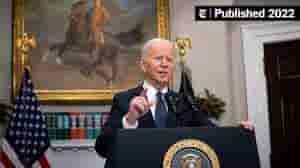In a recent press conference with Ukrainian President Zelensky, President Biden made a significant statement acknowledging Ukraine’s already-won victory in the ongoing conflict with Russia. This recognition, if leveraged effectively, could serve as the foundation for a new U.S. approach to the situation, one that explores the potential for a compromise peace that positions Ukraine as a victor on its own terms.

“Biden’s Recognition of Ukraine’s Strategic Victory: A Path to a Compromise Peace?”
Biden’s assertion that Ukraine has triumphed by thwarting Russia’s initial plan to subjugate the entire country opens the door to a narrative shift. By framing a compromise peace as a Ukrainian victory and a Russian setback, albeit not a total defeat, the Biden administration could redefine the narrative surrounding the conflict and pave the way for a diplomatic resolution.
Ukraine’s achievements in 2022 extend beyond merely resisting Russian aggression. The Ukrainian forces, with Western assistance, have successfully preserved the independence and Western orientation of 80 percent of former Soviet Ukraine. This marks a historic shift, reversing more than three centuries of history during which Ukraine, in various forms, was under Russian influence.
The comparison to Finland’s resistance during World War II, as highlighted by Ukrainian historian Serhii Plokhy, underscores the strategic importance of Ukraine’s resilience. Finland’s heroic resistance convinced Stalin that conquering the entire country would be more trouble than it was worth, allowing Finland to maintain its independence and democratic statehood.
President Zelensky’s categorical rejection of any territorial cession to Russia aligns with the strength and unity of Ukrainian nationalism demonstrated throughout the conflict. While annexation is off the table, Zelensky has opted for a defensive strategy, fortifying existing positions. This approach, if sustained, may result in the de facto Russian control of the currently held territory.
The article raises a crucial question regarding the sustainability of U.S. aid to Ukraine. Even if the Biden administration secures additional aid, the prospect of securing such assistance indefinitely is questioned. The disproportionate forces and resources between Ukraine and Russia make a sustained military effort challenging without ongoing external support.
Biden’s cryptic statement on NATO membership for Ukraine adds another layer to the evolving diplomatic landscape. While he asserted that “NATO will be part of Ukraine’s future,” the article suggests that this does not necessarily imply immediate membership. This opens the door to a nuanced diplomatic approach that considers Ukraine’s geopolitical reality.
In conclusion, Biden’s recognition of Ukraine’s strategic victory presents an opportunity for a reimagined diplomatic strategy. A compromise peace, framed as a Ukrainian triumph, could offer a way forward in a conflict that has endured for far too long. The evolving dynamics between Ukraine, Russia, and NATO underscore the complex geopolitical considerations at play in this critical international situation.
















